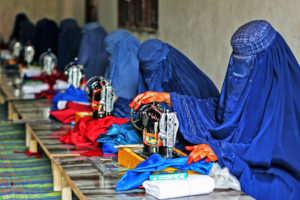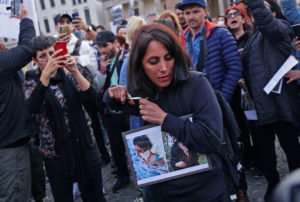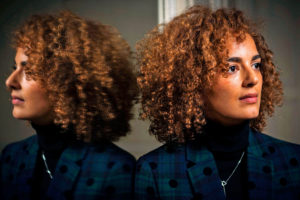We tend to associate Iran with repressive morality police hunting down women for wearing loose hijabs. We think of 22-year-old Jina Mahsa Amini, who died in police custody a year ago after being caught wearing an “improper” headscarf — and the young Iranians who risked their lives in protest. What doesn’t spring to mind are gay sex scandals. And yet, that was the story of last summer in Iran.
It all started in July, when a video was leaked of an official in the Ministry of Islamic Guidance having sex with another man. He was sacked soon after. A month later, a second video surfaced of a cleric having sex with the husband of his wife’s sister. Both affairs gripped Iranian society — and both have since come to symbolise the hypocrisy of the regime’s Sharia laws regarding sexual conduct, which even members of its pious elite don’t adhere to. The gap between the illusion of public piety and what really goes on in people’s bedrooms has been mercilessly exposed.
To some extent, sex scandals are nothing new in Iranian society. In 2008, Reza Zarei, the former police chief of “vice crimes”, was caught in a brothel with six prostitutes whom he demanded pray naked in front of him. In 2016, Saeed Toosi, “Khamenei’s favourite Quran reciter”, was charged with sexually abusing his students when they were aged 12 and 13. He was later acquitted — an outcome seen by many as related to his close connections to the Supreme Leader.
In a country where sexual expression is severely punished, the hypocrisy of regime officials has started to burn. “For them, everything is allowed,” says Amir, a gay literature student in Tehran. “It’s only forbidden for us. They are comfortable, but they’re inflicting suffering on us.” Amir has experienced first-hand the hypocrisy of regime officials. Once, he was sexually harassed in public and had his phone stolen. Upon reporting the incident to the police, the officer took his number only to call him later in an attempt to persuade him to spend the night with him. Another time, a cleric chatted him up in the subway by reciting the poems of Saadi.
Despite the vibrant LGBT+ scene in Tehran, growing up gay can be a lonely experience in the Islamic Republic. And for much of his life, Amir has struggled with his mental health. Sex education in Iran doesn’t amount to much beyond a cleric telling students that masturbation is a sin and to stay away from the opposite sex. As a result, Amir only discovered the concept of homosexuality after an unorthodox psychologist took him under his wing. Until then, he had suspected that he was a woman trapped in a man’s body and needed gender-reassignment surgery. Indeed, the Iranian government believes that homosexuality is an illness that can be cured through such medical intervention. It harshly persecutes LGBT Iranians, but permits and subsidises gender reassignment, which pressures many queer Iranians to undergo surgery.
On those dating apps where LGBT people tend to seek each other out, Amir is always on his guard. Iran’s cyber forces are known to conduct undercover activity on the platforms to gather incriminating evidence. “They not only reveal and report the identities of gays, but sometimes they even engage in sexual relations and exploit them first,” he says. “The only means we had to meet each other has been made unsafe too.”
And it isn’t only gay men who suffer. At school, certain boys with “submissive” traits, such as hairlessness and pale skin, are particularly vulnerable to sexual harassment. They are known as chaqal, and to avoid being branded as such, it’s common for boys to start fights and put on a tough front: Khosro, now a 36-year-old émigré living in Europe, stopped wearing shorts and took up smoking. Yet, at the age of 12, he was raped by a stranger in a neighbourhood alley on his way to play video games with a friend. In the years since, Khosro has lived in depression and fear, only realising once he left Iran how “inhumane” and “disgusting” the environment was.
In Khosro’s eyes, what happened to him was a symptom of a sick society that sexually repressed and pathologised its citizens to breaking point. “You have sexual desires that you’re not allowed to express due to the backward culture rooted in religion,” he tells me. “You don’t have the money to get married. Then, who’s available? Someone ‘feminine’ at school, a child in the neighbourhood, or your cousin who is ‘submissive’ — you go after them instead. That’s the root of all of this. Something is denied to you, so you take the first available option to meet your desires.”
He continues: “I blame everything. I blame the culture, the religion, the system which is taking advantage of religion. It’s just sick. It’s like cancer. Nothing is working the way it should.” “Ideology can’t correct the instincts of people. If you tell people every day, ‘You can’t do this’, it’s eventually going to explode in another way.”
For Khosro, the Iranian regime is pursuing a policy of “gender apartheid”, with students separated by gender for most of their education. At the entrance to universities, campus security screens for sexually suggestive behaviour, such as wearing nail polish or excessive make-up. In gender-segregated cafeterias, a chemical called camphor is even slipped into students’ food with the aim of regulating their libidos.
Sarina, a film student in Tehran, tells me how the sex education and generally prohibitive environment in Iran left her frightened of the opposite sex and unable to form healthy romantic relationships. “Gender apartheid has created a pathological and complex-ridden mindset across genders,” she says. “They have stunted our development.” This frustration has led many in her circle to stop dating men altogether — with most exclusively in same-sex relationships. Yet, segregation has also increased Sarina’s curiosity about the opposite sex. She remembers how her school had a large fig tree which spanned the walls separating it from the adjacent boy’s school. In autumn, the pupils would shake the tree and play a game where they would throw figs over the walls to each other.
According to Pardis Mahdavi, who did fieldwork on sexuality in Iran in the 2000s for her book Passionate Uprisings: Iran’s Sexual Revolution, the redlining of sexuality in Iran has only led to people spending “a lot of time thinking about sex and talking about it”. The trouble is misinformation and an over-reliance on peers for advice. Couples only receive robust sex education through a mandatory programme just before marriage, which on average occurs at the age of 26 — but Iranians tend to lose their virginity in their teens. This means there is a decade-long gap in which Iranians receive little-to-no sex education, Mahdavi says, and for a significant number of people, porn is their primary resource.
Some women have taken advantage of the sensitivity around sex by using it as a language of protest. Over the past year, several Iranian women have generated viral controversy by dancing provocatively to religious music, “mourning” during religious holidays by posting photos of themselves in black underwear, and exposing their bras in front of anti-regime slogans.
Of course, sexual repression isn’t just based on the formal laws of Iran’s theocracy: conservative values also dominate a vocal subsection of society. In everyday life, neighbours and older people survey, judge and patrol the behaviour of others without necessarily being tied to the regime — and women are particularly scrutinised. I noticed this myself when I regularly visited Iran in the 2010s. Once, a woman I was seeing asked, as we approached her home, if I would walk around her block a few times on my own, so that any potential onlookers would not see us enter the building together.
This level of social surveillance is what Rira, a bisexual psychology student from a small town in central Iran, calls the “smaller Islamic Republic” — and it condemns her to live a double life. “I do everything that is forbidden, and I want to experience everything,” she says. “I want to follow my own path, to make my own decisions. That’s not something that this culture, this society and this country can give me.” She keeps her sex life secret from her family: in her rural town, sexually liberated women have a reputation as “prostitutes”.
The situation is even worse for women who live alone. Niloufar, a 31-year-old theatre teacher in Tehran, moved out on her own in her early twenties. When she first arrived in her apartment, her neighbours called her mother to tell them that their daughter had run away. Later on, they would report any visitors to her family — especially if they were male. Niloufar tells me that one of her friends in the holy city of Mashhad was arrested after her neighbours told the police that she was socialising alone with a man and drinking alcohol.
Niloufar has paid a high price for her autonomy: she was recently released from prison on bail and will appear in court on trumped-up charges of “indecent hijab”. “They harass me, they arrest me, but when I come out, I will continue my life as before, just so that they don’t get their way,” she says. “They want to put you down and make sure you stay there. But you get up to show them that they can’t silence you.”
Disclaimer
Some of the posts we share are controversial and we do not necessarily agree with them in the whole extend. Sometimes we agree with the content or part of it but we do not agree with the narration or language. Nevertheless we find them somehow interesting, valuable and/or informative or we share them, because we strongly believe in freedom of speech, free press and journalism. We strongly encourage you to have a critical approach to all the content, do your own research and analysis to build your own opinion.
We would be glad to have your feedback.
Source: UnHerd Read the original article here: https://unherd.com/




